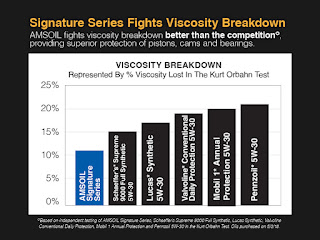Z-ROD® Keeps Classic Vehicles Street-Ready
AMSOIL Z-ROD® Synthetic Motor Oil protects engines on the highway and in the garage.
New 10W-40 viscosity joins the lineup, protecting engines on the street and during storage.
Taking your classic car or hot rod out of storage is an exciting time for enthusiasts. For many, it marks the end of a long winter or lengthy period of inactivity during which their prized car was stored under cover in the garage.
Storage invites engine-damaging corrosion
During that time, rust or corrosion may have formed on engine parts due to humidity and moisture from changes in ambient temperature.
Rust and corrosion can be just as devastating to an engine as dirt or sludge. It can flake off metal and populate the oil with wear-causing particles, which scour bearings, cam lobes and other parts before the filter has a chance to capture them.
AMSOIL fights corrosion
We formulated AMSOIL Z-ROD Synthetic Motor Oil to prevent this scenario.
It contains potent rust and corrosion inhibitors that protect the inside of your engine during storage so you can rest assured it will be ready to roll when you are.
Motor oil has no natural ability to resist rust or corrosion. Instead, special inhibitors must be added to the formulation to keep metal components protected. Not all motor oils contain sufficient rust and corrosion inhibitors to protect engines during long-term storage.
Added ZDDP for added wear protection
Flat-tappet cams, found in many classic cars and hot rods, present another challenge some motor oils aren’t formulated to handle.
Their design makes them especially vulnerable to wear. As the name indicates, the tappet, or lifter, is flat. During operation, the surface of the cam lobe slides rapidly over the surface of the tappet, producing high friction and temperatures. The camshaft and lifters are responsible for triggering the precisely tuned movements of the valvetrain. Here, the use of anti-wear additives becomes crucial.
Zinc dialkyldithiophosphate (ZDDP) is a commonly used motor oil additive that provides anti-wear protection and minimizes lubricant breakdown. ZDDP also exhibits mild extreme-pressure protection. As temperatures in the engine rise, ZDDP decomposes, and the resulting chemistry protects critical metal surfaces.
Because most V-8 engines of the muscle car era came standard with flat-tappet cams, the problem is prevalent to classic-car and hot rod owners.
Modern oils aren’t formulated to tackle this problem. They contain reduced ZDDP levels due to its propensity to harm catalytic converters. For that reason, it’s best to use a high-ZDDP oil formulated specifically for classic cars and hot rods, such as AMSOIL Z-ROD Synthetic Motor Oil. It’s available in 10W-30, 10W-40 and 20W-50.
- Added ZDDP to protect flat-tappet cams
- Long-term rust and corrosion protection









